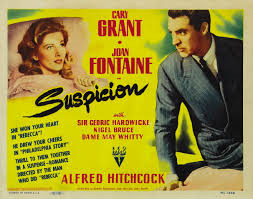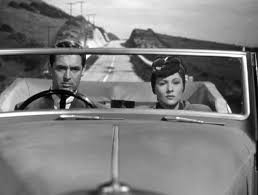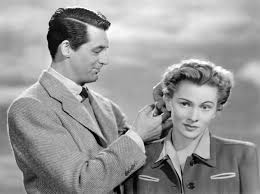
Having read Francis’ Iles brilliant book, Before the Fact (1932), I was interested to see how Hitchcock adapted it and conveniently it was released in this month’s chosen year for Past Offences Monthly Challenge, 1941.
‘Some women give birth to murderers, some go to bed with them, and some marry them. Lina Aysgarth had lived with her husband nearly eight years before she realised that she was married to a murderer’ (Before the Fact, 1932: 5)
To a small extent the film stays true to the novel. Lina (Joan Fontaine) and Johnny’s (Cary Grant) courtship commences the start of the film and Lina becomes more and more besotted by Johnny eventually eloping with him. And of course it is during her marriage that Lina begins to wonder about her husband; his inability to keep a job and to not gamble, his disregard for other peoples’ possessions and the truth (you know just the small things). However, it is at this point that the film really diverges from the book, as Lina just seems to alternate between going around in a daze and turning a blind eye to Johnny’s behaviour, (thinking his plan to depend on her inheritance makes him a ‘baby’) and acting neurotically and generally like a twit. Lina in the novel is a much more complex character and in a way is made of sterner stuff, in particular thinking she can reform her husband.
Unsurprisingly the film has to cut out a lot of events from the book, but I think in doing so this makes Lina’s suspicions that her husband is a murderer very rushed and centred predominantly on Binky Thwaite, who is a rich friend of Johnny’s. As events progress and Johnny’s need for cash becomes more essential… this suspicion/fear intensifies and develops into the notion that she is also in Johnny’s deathly sights. Hitchcock attempts to do a dramatic and tense ending, with all of Lina’s worries coming together in one big moment, but for me it was a huge disappointment, looking insignificant in comparison to the ending of the novel. Martin Edwards in his new (ish) book, The Golden Age of Murder (2015), agrees saying that, ‘not even the Master of Suspense could match Berkeley’s sheer nerve, and the ending of the film reversed that of the book’ (Edwards, 2015: 144). Moreover, I found that Hitchcock’s ending ruined the characterisation of the Johnny and Lina, as their behaviour had to do a U turn to make such an ending possible. In the novel, Iles doesn’t pull away from the depravities and weaknesses of human nature and their consequences, whereas the film seems much tamer in comparison.

Edwards (2015) also suggests that Cary Grant was ‘miscast as Johnny’ (Edwards, 2015: 144) and to an extent I can see this, but for me the greater miscasting was Joan Fontaine as Lina or perhaps it’s the version of Lina she does which annoyed me so much. My dislike began with how uppity Lina comes across at the start and is compounded as Lina’s character is oversimplified in the rest of the film. You have to remember that Lina increasingly realises her husband is a murderer, yet she doesn’t run to the police or tell anyone. Berkeley, as recorded in Edwards’ book, said that his ‘aim was to explore this curious twist of female psychology and try to make it clear how such a thing can happen’ (Edwards, 2015: 144). And in the book this does happen, where even for a time Lina does leave Johnny but goes back to him. Lina’s relationship with Johnny is shown in the book with all of its complexities and nuances and makes her actions which seem ludicrous when summarised, entirely plausible for that situation. Fontaine’s simplified version of Lina’s character makes this impossible and so she just comes across as a hysterical ninny, rather than somebody who has examined all the facts and has still decided to be in a relationship with a murderer.

All in all I think my rant-review (sorry), suggests that Frances Iles brilliant story is best read rather than watched. This sadly is not Hitchcock at his best and films such as Dial M for Murder are much superior.
Well, it’s definitely second-tier Hitchcock, but that isn’t always a bad thing. I had the distinct advantage of NOT having read the book, so I can’t address your comparisons. I do know that Hitchcock WANTED to make Johnny a killer and wasn’t allowed to by the studios. (He was always playing with the popular image of great stars, making his films with Grant and James Stewart some of their best work.) I think he knew how stupid the change was, and it certainly makes for a jarring and ridiculous ending. Switching from mystery lover to Hitchcock enthusiast, there are a number of cool things in the film that make it interesting to watch, including some cool shots to increase our suspicion of Johnny. (The glowing milk is not subtle, but it’s fun!) Still, it’s not one of the Master’s films that I turn to over and over again. My big problem with this, as with all her films, is Joan Fontaine. I’ve never seen her have any chemistry with her male co-stars, not here and not in Rebecca with Olivier. She’s much better in The Women because she can be completely silly AND there’s no man she has to act opposite! I do think Grant is interesting here. He is a very handsome man, but he has always left me cold! Hitchcock could tap into that emotionally frigid interior very well, making the idea that Grant COULD be a sociopath totally believable. It’s just unfortunate that Hitchcock couldn’t take it all the way, for the surface looks and charm combined with the empty heart COULD have summoned the essence of Johnny Aysgarth!
LikeLiked by 1 person
Yeah I agree with you about Fontaine. She didn’t really seem to be in love with Johnny, as Lina and if she tries to appear so, she just comes across a bit silly. You definitely definitely definitely need to read the book though, absolutely amazing.
LikeLike
On the other hand, Fontaine’s performance brought her an Oscar.
Incidentally, I’ve read (and I can’t now recall where) that Hitchcock was possibly fibbing about having had the ending forced on him by the studio.
LikeLiked by 1 person
Oh cool I never knew that. Surprised Fontaine got an Oscar for that performance though.
LikeLike
I wouldn’t be surprised, realthog! But Hitchcock’s lies were so entertaining that I like to spread them around as truth!
LikeLike
The complexities of the Hayes Production Code may have affected how Hitchcock could portray Lina and Johnny’s relationship too. The big problem is that neither of them is very interesting in the film..
LikeLiked by 1 person
Haven’t heard of the Hayes Production Code before. What is it?
LikeLike
Short answer: Joseph Hayes created a morality code at the behest of the Catholic Church which did incalculable damage to the American film Industry for decades!
LikeLiked by 1 person
ahh, must have been a strict code.
LikeLike
You might find the Wikipedia article on the Hays Production Code useful: https://en.wikipedia.org/wiki/Motion_Picture_Production_Code. This is the code, by the way, that’s referred to in the term “Pre-Code movies”, a field of much interest to many movie aficionados. Before the Code, Hollywood movies were a lot saucier than they were for many years after its introduction.
One of the strictures of the Code was that the bad guys couldn’t get away with/profit from their crime. This could, I believe (I haven’t read it) have caused difficulties for Hitch had he gone along with the original Nathanael West/Boris Ingster screenplay, which I gather was a lot closer to the book. But Hitch threw that out — apparently of his own volition. Whether the new script that he then commissioned originally had the same ending as the novel is something that I simply do not know.
LikeLiked by 1 person
Thanks I’ll have to take a look at that link. I never realised there were things like codes which could limit/restraint film scripts.
LikeLike
I don’t think one could underestimate the harm the Code did. The Church resented and feared the frank depiction of good and evil, sexuality, and the dark side of our socio-political world in the films of the late-20’s and early 30’s, so they repressed it all. (I think that this is largely the reason that modern American audiences embrace violence but still cringe at the depiction of even nudity on screen, where European studios are much more open about nearly everything.) I made a mistake in names earlier: Joseph Breen was the man who held so much power (and wielded it ruthlessly) in applying the Hayes Code to films. Hitchcock was brilliant in the way he learned to circumvent a lot of the Hayes restrictions: he would write or even film things that simply had to be cut and then bargain them out in order to keep the things he really wanted. Thus, he circumvented the censors and included some really racy stuff for the time (i.e., the train going through the tunnel in North by Northwest and nearly EVERYTHING about Psycho – not just the murder in the shower but a post-coital Janet Leigh in a bra at the beginning, the first view of a toilet in movie history and the final understanding that, although “mother” has been captured, she is the ultimate winner of this game!)
LikeLiked by 1 person
Thanks I’ll have to take a look at that link.
It might be worth your while to do so. The Code was possibly the most pivotal event in Hollywood moviemaking.
LikeLiked by 2 people
[…] bigger budget movie was Alfred Hitchcock’s Suspicion, starring Cary Grant and Joan Fontaine, watched by Kate at […]
LikeLike
Like bkfriedman I’d heard that Hitchcock wanted the ending to reveal that Johnny was a murderer, but was told to change it as the studio feared that it would spoil the reputation of their star, Cary Grant. Apparently Grant was also very disappointed that the ending was reversed as his main reason for accepting the role was that he’d longed to play a “baddie”. I think it would have been fascinating to see what job Grant would have made of this. I think he’s a rather better actor than he is generally perceived.
LikeLiked by 1 person
I definitely agree it would have been interesting to see Grant do the ending properly. It is also interesting how the studios thought the real ending would ruin his reputation. Not sure if that sort of issue still crops up today in films.
LikeLike
I thought Cary Grant did a great job portraying the charm, the playful indifference to the wrongs, and the slip of the mask when berating Lina for challenging his plan with Beaky.
Have we ever seen Tom Hanks as a murderer? He did one movie years and years ago as a disreputable/despicable character and the movie bombed. So, I get that it wouldn’t hurt Grant, but it would hurt the reception of the movie.
LikeLiked by 1 person
[…] this post you may well be thinking there have been some big omissions. In the case of films such as Suspicion (1941) and Sabotage (1936), I have watched them and love is key element of them, but for me as my […]
LikeLike
I love this movie; however, I feel as though what few problems that exist can be attributed directly to Hitchcock.
He knew from the beginning that he couldn’t cast Cary Grant as a murderer. Joseph Cotten or Rex Harrison? Yes.
So, if he wanted Grant, then he should have manned up, stop having his little pout, and write an ending more befitting an otherwise great movie. Instead of a poorly written minute of incredulous resolution, Hitchcock could have had 15 minutes of a different perspective based on something as simple as the police catching the guy guilty of Beaky’s negligent homicide.
A narcissist doesn’t have to a murderer. A well brought up lady can marry on a charmed whim and be both naive and analytic coming to the wrong conclusion.
LikeLiked by 1 person
If it had been a film not based on a book then I might have found the ending more tolerable, but I think it was because I had read the book beforehand and knew its chilling ending that, that’s the ending I wanted. But you make some good points.
LikeLike
[…] I am glad that a happy ending was not tagged onto the end, in the way Hitchcock does with his film Suspicion, which veers away from the dark ending of the novel it was based on. I think this is the sort of […]
LikeLike
I am in complete agreement with this article. i have always despised “Suspicion,” from the use of the nickname “Monkeyface” to the poor script and rather inferior performances by the stars. This is bottom-of-the-barrel Hitchcock. That Fontaine won an Oscar for her performance shows what a joke the Oscars have been for years. Grant is so glib and smarmy you want to smack him from the first frame.
The best performances in the film are Nigel Bruce, Leo G. Carroll’s tiny bit as Capt. Melback, and Auriol Lee as the mystery book author. The film has no main point; why was this movie even made? It is a bad outing for all concerned.
LikeLiked by 1 person
I have enjoyed Grant in other films, but in this one he just doesn’t get the character right, due to the plot changes. Have you read the book the film is “based” on? Much more chilling in my opinion.
LikeLike
I do want to read the book. I had the feeling Hitchcock lost interest half-way through this movie. It’s just so unlike his usual fine work. The movie goes on and on with no point. .
LikeLiked by 1 person
I would definitely recommend reading the book as if nothing else you will get a completely different ending lol
LikeLike